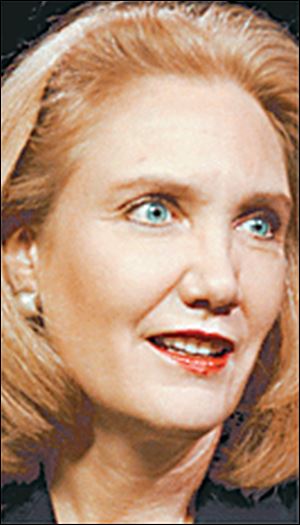
Lucas County prosecutor says payouts for sick time were proper
4/7/2005
Bates
Former Lucas County employees didn't receive excess sick time payments when they retired, according to an opinion issued yesterday by Lucas County Prosecutor Julia Bates.
Mrs. Bates determined that all nonunion county employees could be paid for up to 40 days of accrued sick time when they retired, not just the employees of the county commissioners.
She based her decision on interviews with two former county commissioners who said a resolution passed in 1978 that allowed employees to be paid for 40 hours of accrued sick time rather than the 30 hours allowed by state law was meant to apply to all county employees.
"They did not want to treat their employees differently than the other employees," Mrs. Bates said. "Their whole purpose in passing the resolution was to treat everyone the same. It makes sense. It's reasonable and logical."
Former Commissioners Francis Szollosi and James Holzemer signed affidavits that the resolution applied to all county employees. Barbara Walker, the county's former human resources director, and John Zeitler, the county's budget chief, also signed affidavits saying they understood the resolution to apply to all nonunion county employees.
The issue arose in January after The Blade reported seven nonunion sheriff's office employees improperly received at least $160,000 in sick-time payouts. Rather than comply with the 40-day cap rule that applied to other nonunion county employees, Sheriff James Telb paid the seven former employees the same as union members, whose contracts allowed for payments greatly in excess of the 40-day cap.
State law, however, didn't allow nonunion employees to receive accrued sick time payments in excess of the 40-day cap called for in the county policy without a commissioners' resolution. The commissioners never passed a resolution allowing the sheriff to make those excess payments.
Sheriff Telb said two of the seven people who improperly received excess sick time checks have paid the money back. He said others have been waiting for Mrs. Bates to determine how the money should be repaid. It's possible, he said, that some may fight the issue in court.
While the payments to sheriff's office employees were scrutinized, the question was raised about whether other county employees were being paid too much for accrued sick time.
In 1978, the commissioners approved a resolution allowing sick time payouts to be capped at 40 days instead of 30. In January, Mrs. Bates said the resolution language appeared to apply just to commissioners' employees rather than those in other county offices. She said yesterday the intent of the former commissioners and the ambiguous resolution led her to believe it covered all county employees.
Until 1990, individual county officeholders could set their own payout levels. In 1990, state law changed to require that officeholders get a resolution from commissioners to deviate from the 30-day caps specified in Ohio law if more than half of the office's budget came from the county general fund.
Tina Skeldon Wozniak, president of the county commissioners, said Mrs. Bates' opinion is fair to the retired county employees. "We're pleased it's being resolved and that it will be clear in the future how this will be dealt with," she said.
Commissioner Maggie Thur-ber said if the former commissioners intended for the resolution to apply to all county employees, "then it was certainly appropriate" for them to receive accrued sick time payments of up to 40 days.
In January, Mrs. Bates asked Ohio Auditor Betty Montgomery to determine whether some former county employees received too much accrued sick time compensation. In early February, Ms. Montgomery said she needed a legal opinion on the issue.
Mrs. Bates said yesterday if all county offices have abided by the 40-day cap rule, a state audit is no longer necessary.
Contact Dale Emch at:
daleemch@theblade.com
or 419-724-6061.